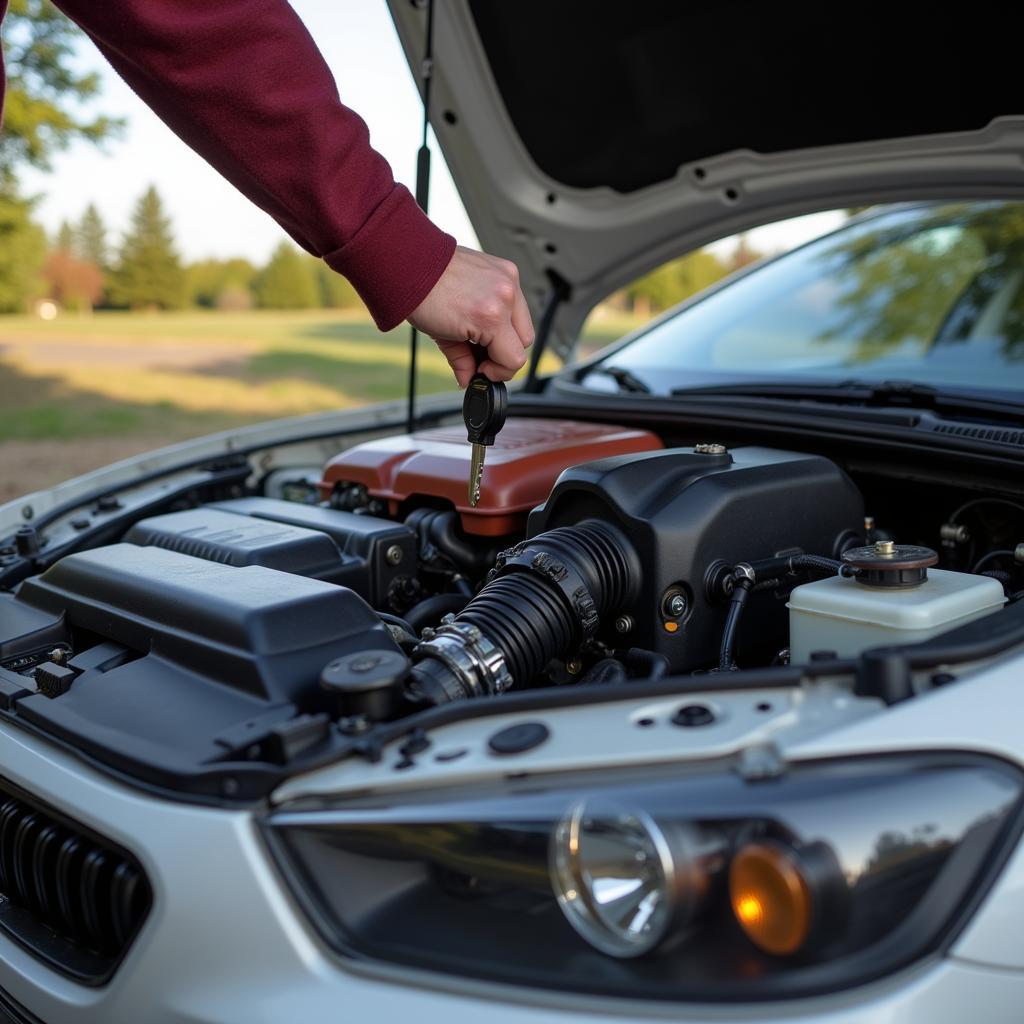A dead car battery is a frustrating experience, but knowing the signs your car battery is going bad can save you from being stranded. From slow engine cranking to dim headlights, several indicators can warn you of impending battery failure. This guide will help you identify these signs so you can take action before your battery leaves you in the lurch.
Recognizing a Failing Car Battery
Is your car struggling to start? Are your headlights dimmer than usual? These are classic signs your car battery is going bad. However, there are other, more subtle indicators you should be aware of. Ignoring these early warning signs could lead to unexpected breakdowns and costly repairs.
Slow Engine Cranking
One of the most common signs of a dying battery is a slow engine crank. When you turn the key, the engine struggles to turn over and takes longer than usual to start. This is often accompanied by a clicking sound.
“A slow crank indicates the battery is struggling to provide enough power to the starter motor,” says automotive electrical expert, Michael Davies, from Automotive Diagnostics Inc. “It’s a clear sign that the battery is nearing the end of its lifespan.”
 Slow engine cranking indicates a dying car battery
Slow engine cranking indicates a dying car battery
Dim Headlights and Interior Lights
Dim headlights, especially when idling, can signal a weakening battery. Similarly, interior lights may appear dimmer than normal, or flicker when the engine isn’t running.
Electrical Issues
A failing battery can affect other electrical systems in your car. You might notice issues with the radio, power windows, or power seats. These components may operate slower than usual or fail to function altogether.
Check Engine Light
The check engine light can illuminate for a variety of reasons, including a failing battery. While this light can be triggered by numerous issues, it’s worth having your battery checked if you’re experiencing other symptoms of battery failure.
Low Battery Fluid Level
Modern car batteries are often sealed, but some older models have removable caps. If your battery has removable caps, check the fluid level. Low fluid can be a sign of a problem and may indicate a need for replacement.
Old Battery Age
Car batteries typically last between three and five years. If your battery is approaching or exceeding this lifespan, it’s a good idea to have it tested and consider replacing it proactively.
“Don’t wait for your battery to completely die before replacing it,” advises automotive engineer, Sarah Chen, of AutoTech Solutions. “Proactive replacement can save you the inconvenience and potential danger of a roadside breakdown.”
What Causes a Car Battery to Go Bad?
Several factors contribute to battery failure, including extreme temperatures, excessive vibration, and parasitic drain from electrical components. Overcharging or undercharging the battery can also shorten its lifespan.
How to Test Your Car Battery
You can test your car battery using a multimeter or have it tested at a local auto parts store or repair shop. A professional test can provide a more accurate assessment of the battery’s health and remaining lifespan.
Conclusion
Recognizing the signs your car battery is going bad is crucial for preventing unexpected breakdowns. From slow engine cranking and dim headlights to electrical issues and an illuminated check engine light, being aware of these indicators can save you time, money, and frustration. Don’t wait until your battery dies completely—proactive testing and replacement are key to maintaining a reliable and safe vehicle.
FAQ
- How often should I replace my car battery? Most car batteries last between three and five years.
- Can I jump-start my car with a dead battery? Yes, but it’s a temporary solution. You should still have your battery tested and potentially replaced.
- What should I do if my car battery dies while driving? Carefully pull over to a safe location and call for roadside assistance.
- How can I prolong the life of my car battery? Avoid extreme temperatures, limit short trips, and ensure your charging system is functioning correctly.
- What is the difference between a dead battery and a failing alternator? A failing alternator will prevent the battery from recharging, while a dead battery simply won’t hold a charge.
- Can a bad battery cause damage to other car parts? Yes, a failing battery can strain the alternator and other electrical components.
- Where can I have my car battery tested? Most auto parts stores and repair shops offer free battery testing.

